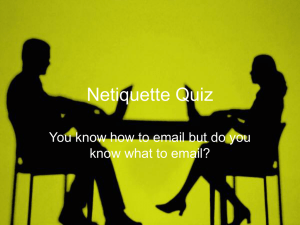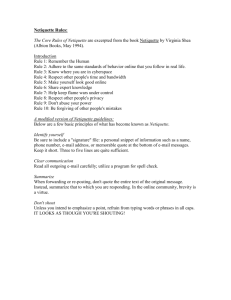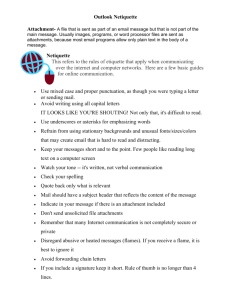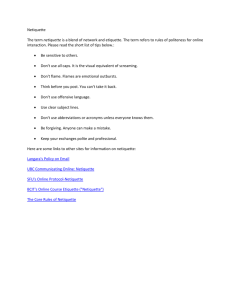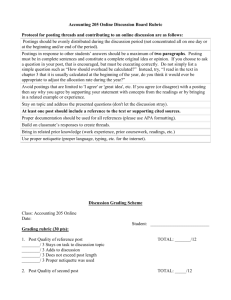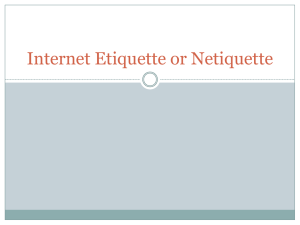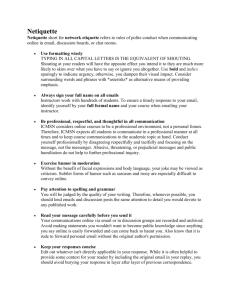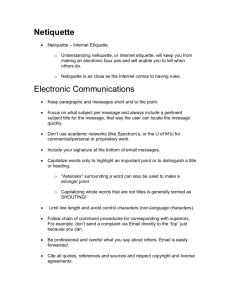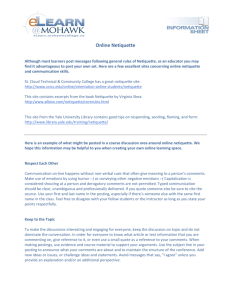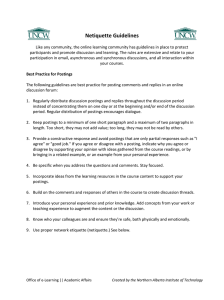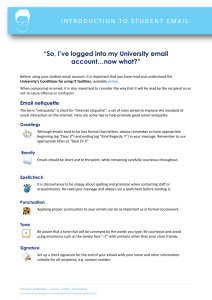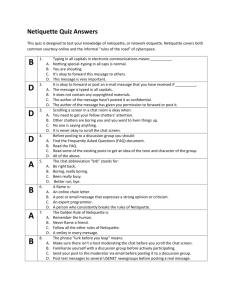Online Netiquette
advertisement
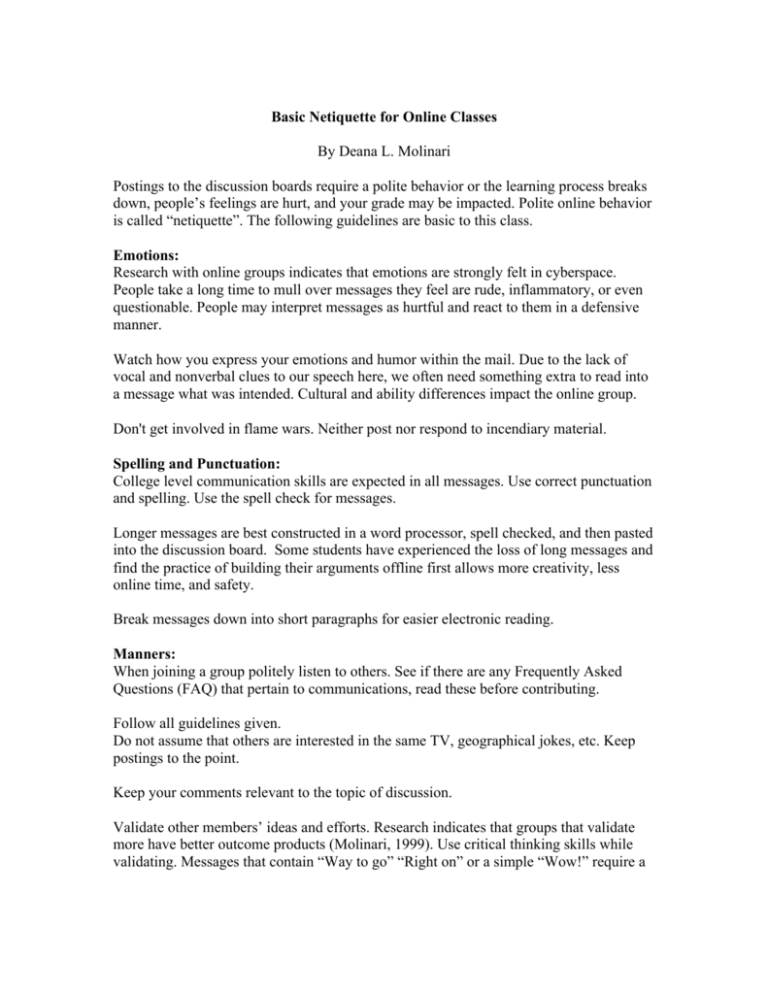
Basic Netiquette for Online Classes By Deana L. Molinari Postings to the discussion boards require a polite behavior or the learning process breaks down, people’s feelings are hurt, and your grade may be impacted. Polite online behavior is called “netiquette”. The following guidelines are basic to this class. Emotions: Research with online groups indicates that emotions are strongly felt in cyberspace. People take a long time to mull over messages they feel are rude, inflammatory, or even questionable. People may interpret messages as hurtful and react to them in a defensive manner. Watch how you express your emotions and humor within the mail. Due to the lack of vocal and nonverbal clues to our speech here, we often need something extra to read into a message what was intended. Cultural and ability differences impact the online group. Don't get involved in flame wars. Neither post nor respond to incendiary material. Spelling and Punctuation: College level communication skills are expected in all messages. Use correct punctuation and spelling. Use the spell check for messages. Longer messages are best constructed in a word processor, spell checked, and then pasted into the discussion board. Some students have experienced the loss of long messages and find the practice of building their arguments offline first allows more creativity, less online time, and safety. Break messages down into short paragraphs for easier electronic reading. Manners: When joining a group politely listen to others. See if there are any Frequently Asked Questions (FAQ) that pertain to communications, read these before contributing. Follow all guidelines given. Do not assume that others are interested in the same TV, geographical jokes, etc. Keep postings to the point. Keep your comments relevant to the topic of discussion. Validate other members’ ideas and efforts. Research indicates that groups that validate more have better outcome products (Molinari, 1999). Use critical thinking skills while validating. Messages that contain “Way to go” “Right on” or a simple “Wow!” require a lot of time to download and do not contribute to the group process. Comments mentioning why something is appreciated are more valuable. Do not use acronyms unless they are common to the class. Strategies to promote problem solving: The ignoring strategy: The ignoring strategy is used in conjunction with the democratic decision-making process. The ignoring strategy states that students need not feel compelled to reply to every message. Sometimes ignoring a statement you disagree with while producing your own thesis and supporting statement is more useful to a group. This strategy saves time by avoiding arguments. This saves hurt feelings by avoiding inflammatory talk. Alternative ideas are appreciated online, differences of opinion produce growth, but anger and hostility block learning (Martinez, 1999). Putting another’s ideas down is considered unprofessional. In other words, professionals disagree by showing why they disagree, not by picking fights. Netiquette requires individuals to respond sensitively to others. The democratic decision-making process: You may want to structure your ideas using the following strategy found in successful groups. Begin your message with a thesis statement and follow up with supporting statements. Then ask for other’s feedback. Be willing to listen to the replies. Provide clarifications and expansions. Build a supporting culture: Consider the larger group whenever communicating. Watch your speech that it does not belittle or inflame. Many habits used in face-to-face speech hurt online. Address individuals at times as well as the group. Consider each other’s feelings and life experiences. Show respect by agreeing to disagree. Do not feel inclined to beat down ideas. A person is attached to that idea somewhere. Remember that people may not read the message until the middle of the night, or at their most vulnerable time and may not possess tolerance. The essence of successful group culture is validation while problem solving Keep the discussion to the discussion board: Discuss class issues on the discussion board. Individual messages can be sent via e-mail when they do not pertain to the group, but the temptation is to problem solve outside the online group. When this occurs, the instructor cannot give you credit for your participation, and someone in the group may be left out of the conversation. Information sharing about issues outside the group can enhance the community of scholarship if the learning environment is maintained on the discussion board. Quotes: Report your sources. Watch out for copyright infringement. It is professional behavior as well as the law. Subject Line: Use the subject line to organize or file discussion topics. Replies: Give a short indication of what you are replying to. Otherwise a person may not know how your remarks fit into the discussion. Often learners read several messages and reply with one message. Summarize the topics you are replying to and then reply. Reading and Posting: Read messages from the first to the last in a thread before responding to them. If everyone does this then a common development of the discussion can be traced. Each person reading and responding using different messages produces cross effort, confusion, and duplication of effort. Find authoritative resources and use them in your replies and initial postings. This is professional behavior, the learning culture, and netiquette. More Netiquette: http://www.in.on.ca/tutorial/netiquette.html The Ten Commandments of Computer Ethics. http://www.fau.edu/netiquette/net/ten.html
